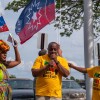A part of the Massachusetts Democratic Party convened in Worcester this weekend. In the form of 3,298 delegates, this part of the party heard from established and emerging leaders then crafted and voted on their party’s platform.
And, as is often the case, this part of the party brings some anger. Just before the convention, one activist told Politico’s Lauren Dezenski that Speaker Robert DeLeo would have been welcomed with booing had he opted to attend. DeLeo is insufficiently Democratic for some progressives.
Former State Senator, and possibly future Democratic candidate, Dan Wolf, went further at a recent gathering, claiming, “It is time for someone to say to Bob DeLeo: We are the Democratic Party. We have a platform that was democratically created by Democrats across the Commonwealth. If you call yourself a Democrat, stand up for our platform and the Democratic values we hold dear or we will primary you."
Notice the “we” in this formulation. Bob DeLeo has been a Democrat his entire life and chosen by Democrats in Winthrop and Revere to be their party’s nominee for the 20th then 19th Suffolk District since 1992.
Who is the “we” here? Some Democratic activists whose vision of the party don’t align with his.
Wolf and others are free to fight other Democrats they view as insufficiently committed to their cause. And it may help him and others as they seek influence within the activist base. Taking their case to voters in an attempt to unseat fellow party members should be encouraged in a democratic society.
But claiming that an element of the activist base is the Democratic Party is historically wrong, not to mention politically untenable. Citizens aren’t exactly looking for more partisanship.
The State Convention and the Democrats who attend it are not the whole of the Democratic party. The platform they put together is a written expression of their aspirations, not a document binding on Democratic voters or elected officials. It is the statement of the Party Organization.
For political scientist V.O. Key, party organizations were just one element of the complex structure of American political parties.
The second leg is Parties in the Electorate, a marriage between the activists and voters who identify with the party. But it is an uneasy marriage as the latter can often be at odds with the former.
Activist Jonathan Cohn wrote in Commonwealth last week, “Massachusetts Democrats could make our Commonwealth a beacon of progressive policymaking. If they aren’t interested, it’s up to activists and voters to make them.”
And yet activists and voters are not always on the same page. Democratic voters have been responsible for nominating Bob DeLeo every two years since 1992. The Party in the Electorate doesn’t always behave the way those who staff Party Organizations desire or demand.
Finally, there are parties in government, those local, regional, state, and national officeholders who caucus together. In Massachusetts, these public officials do not need the support of a party convention to run as Democrats. They only need the support of local party members in a primary. They are free to disagree in part or in total with the Convention and its platform. They are not members of parliamentary parties, but members of decentralized, and often atomized, party organizations in a system of separation of powers, the hallmark of our anti-party Constitution.
Party organizations, parties in the electorate, and parties in government form a complex tripod of the American party system.
As I noted last year, “This tripod is often unbalanced. Each part (and the many subparts within) has a different vision of its role. They can also differ on tactics and ideology. Vocal anger from Democratic activists is a sign of both a healthy party in the electorate as well as a sign of consternation with the party in government.”
The Democratic party in Massachusetts is not simply the activists who show up to write a platform. It never has been. Their role is important and, in an era of Trump, may be greater than in years gone by. And party members in government cannot ignore that the thousands of people who showed up in Worcester because those same people staff phone banks, knock on doors, donate money and time to the cause.
But there are roughly 1,490,000 Democrats in Massachusetts. That they don’t go to the Convention or craft a platform doesn’t make them any less Democratic. That the Speaker doesn’t express fealty to the entire platform doesn’t make him any less a Democrat either. The 1,467 Democrats who nominated DeLeo in 2016 are just as empowered to decide what the party stands for as the 3,298 who met in Worcester on Saturday.
Activists assembled in Convention are only part of the Democratic party in Massachusetts. A Speaker, popular with his constituents and his colleagues, is another big part.
American parties are complex organizations. Be wary of those who suggest they speak for a party in its entirety.




